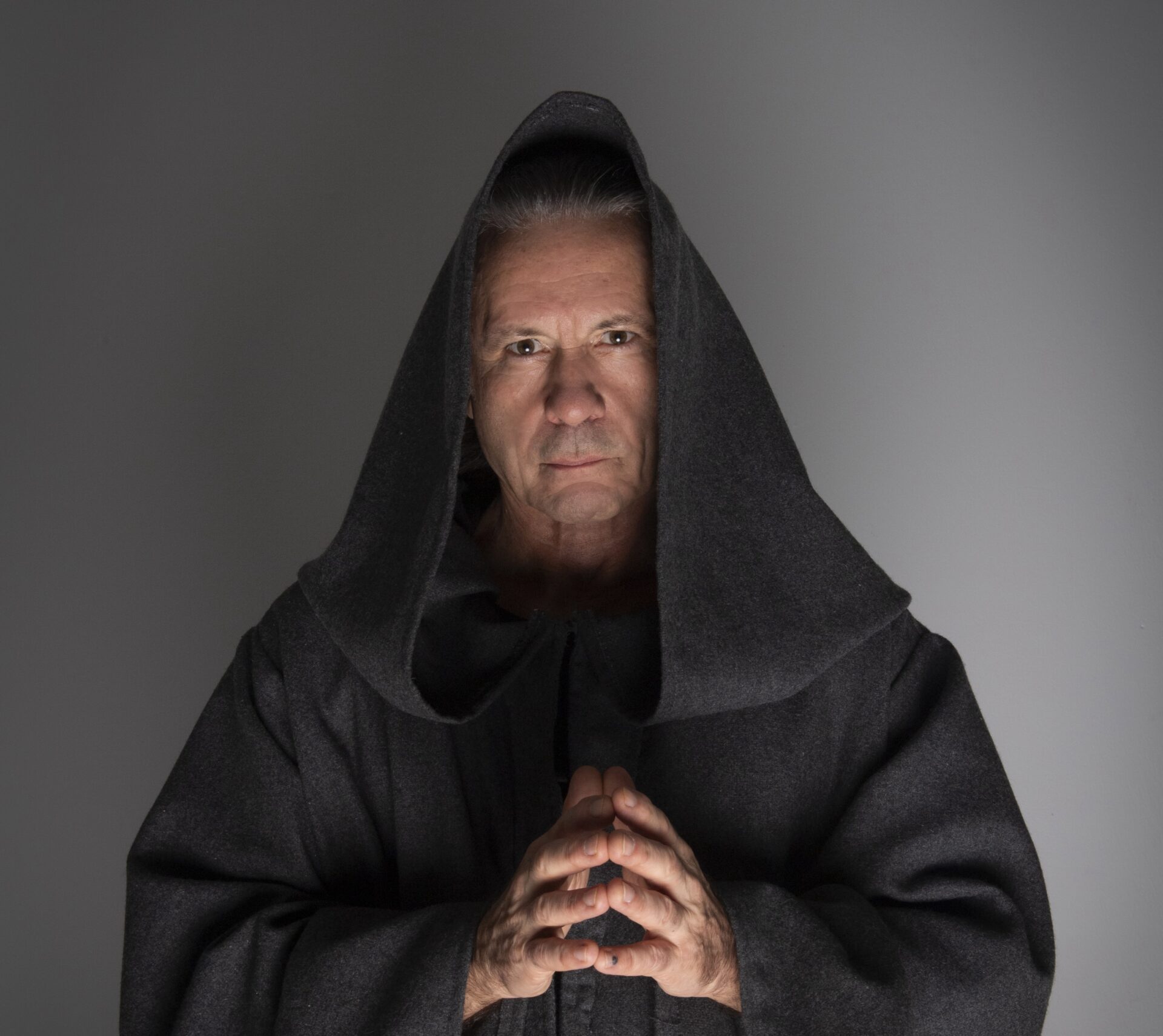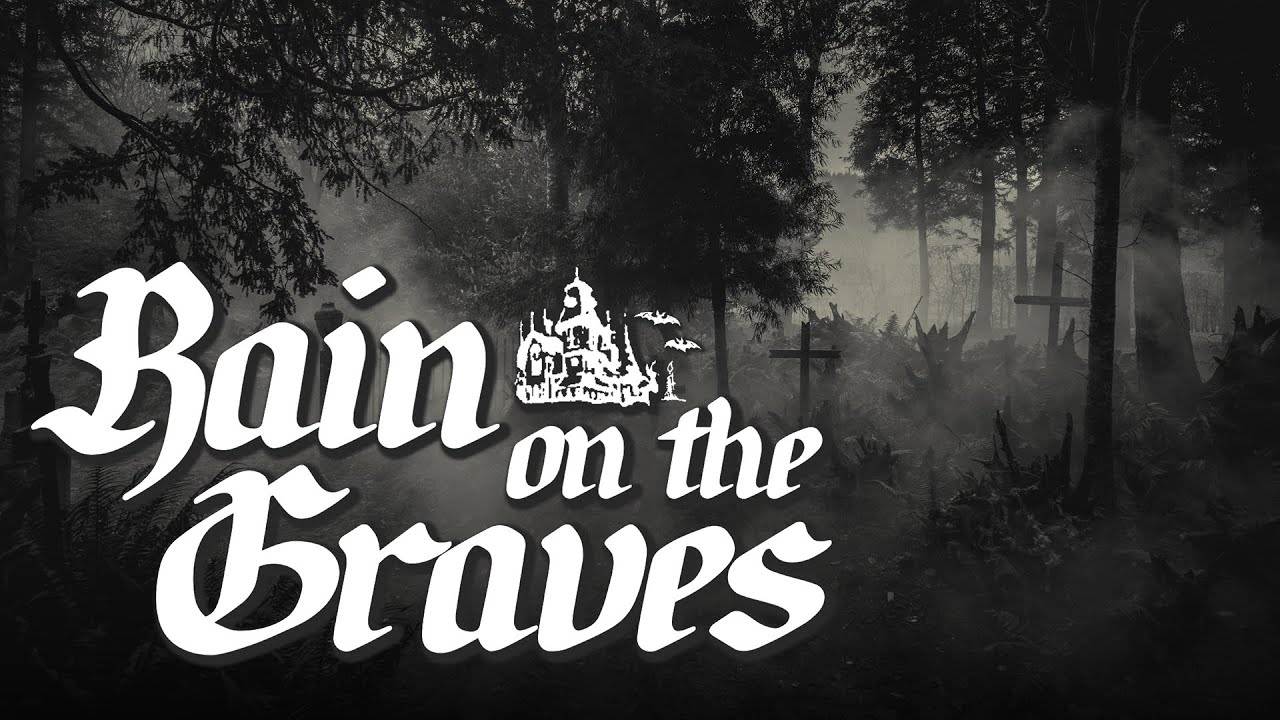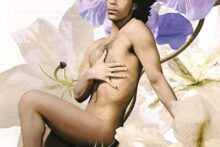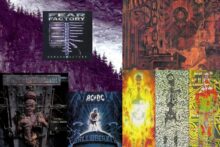“An Iron Maiden show is a magic ritual,” Bruce Dickinson confirms. “That’s absolutely what is going on. I look at what I’m doing – the way I behave, my placement on the stage at a certain point in the set – as almost shamanic. What you are doing is playing with the audience’s energy, raising it, lowering it, reflecting it back.”
Dickinson is speaking via Zoom from Los Angeles, where he is currently rehearsing for his first solo tour in over twenty years. There is something uncanny about finding someone with as big a presence as Bruce in a tiny box on your laptop screen, like a YouTube video that has come to life and started talking back. His framing of the nature of Maiden gigs as rituals, in contrast, is less strange. I suspect many Maiden fans have come to a similar conclusion over the years.
As singer and frontman, Dickinson is the focus of all the energies unleashed during each performance. This is not an easy thing to deal with. “I regard myself when I’m onstage as being essentially transparent. That’s the only way I can deal with the level of intensity that’s happening – removing myself from the equation and letting the song take over. Sometimes, if I throw a shit-fit at some guy in the audience, it’s because they’ve behaved in a way that’s broken the spell. That’s infuriating, because you were so in that moment of actual non-existence. It looks like you’re there, but actually you’re not. You’ve vanished into the music and the show – that’s what propels you, that’s what you’ve become.”
A key moment in this ritual is the self-titled song ‘Iron Maiden’, which is always played at the end of the main set. A Maiden gig where this song was skipped or played at a different position would be unthinkable, verging on sacrilege. The song builds to a specific moment when a giant effigy of the band’s monstrous figurehead Eddie emerges from the back of the stage. This might not sound like a big deal written down, but all those who have experienced it for real will know the impact it has. You leave the gig feeling two inches taller than when you went in.
Eddie is sometimes described as the band’s ‘mascot’ or ‘brand’, but that does him a disservice. Eddie is the band’s spirit. “Eddie’s got a bit of an edge to him,” Bruce explains. “He’s always part of the awkward squad. He never fits in with anything. He doesn’t sit comfortably with the mediocre.” Eddie has the energy of a yappy pre-pubescent boy who still feels like they can do anything. On the album sleeves and T-shirts, he is whatever he wants to be – a World War Two fighter ace, cyborg bounty hunter, samurai, Egyptian god or even Margaret Thatcher’s murderer. The only thing Eddie could not be is a victim.
An Iron Maiden show is more of a theatrical performance than a gig. It has elaborate stage sets which take you out of your normal life and put you in another time and place. Their songs, rich in damnation and melodrama, are stories of myth, history, war and adventure. Historically, the band have almost always performed in front of backdrops and drapes, rather than video screens. This forces the audience to focus their attention on the performance rather than zone out gazing at a giant telly in the background. The ritual performance builds to the moment when the giant Eddie rises up from the back of the stage. At that moment, Eddie rises up inside the audience as well. They have become the spirit of the music. This is a rare magical ritual indeed, in that it reliably works.
The power of Eddie would have appealed to Dickinson in his brutal early teenage years. He was sent away from his family to Oundle, a boarding school in Northamptonshire. “I was on my own in boarding school and I got the shit kicked out of me on a regular basis. Like, every night. The lights would go out in the dormitory and 15 kids would beat the crap out of me. It was pretty horrible, but it builds up a degree of magical toughness which stood me in good stead. Not that I’d recommend it. There are other ways of doing that which are less unpleasant.”
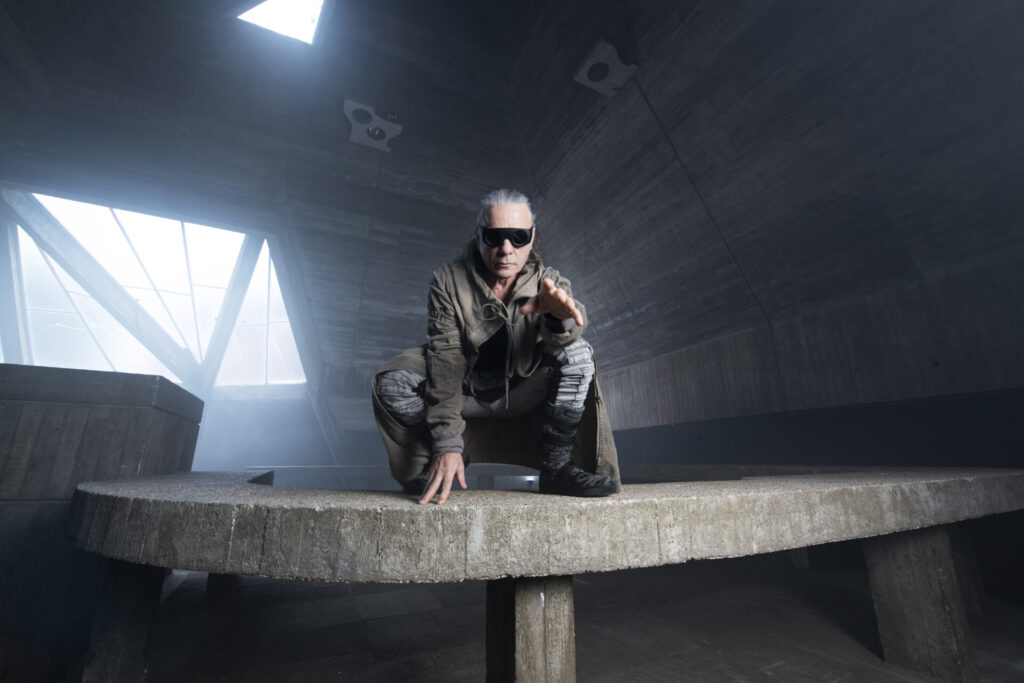
For those who have seen the adult Dickinson perform or heard his voice, the idea that he was ever powerless is hard to imagine. It was at this age that he began reading the occult books which are so evident in his lyrics, as a way to claim some power for himself. In a similar way, heavy metal is all about empowering the powerless. This is why it can seem ludicrous to people from a more comfortable background.
Psychologists now have a better understanding of the damage that the British private school system can do to people. The key symptoms of what is now known as Boarding School Syndrome include an inability to feel at home anywhere, depression, and difficulty in forming relationships, and I ask the singer if he relates to any of these. “I think probably all of those apply to me,” he admits. “With the exception of depression. I built up an overinflated sense of self-esteem in response to having the shit kicked out of me every day. You can either go, ‘Oh, I must deserve it.’ Or you go, ‘You’re a bunch of idiots. You won’t hit me again. It won’t hurt.’ You build up this shield of mental invulnerability because that’s the only way you can deal with it. It’s not generally useful because you don’t want to go wandering around under an invisible shield. It makes you aloof and distant.”
As well as being a multi-millionaire global rock star, Dickinson is a national-standard fencer, an airline pilot, a brewer, a cancer survivor, an author, a businessman and the Honorary Group Captain of an RAF squadron. His adult life, in other words, is the overachieving ‘Boys Own’ fantasy of a powerless, bullied schoolboy. In his belief that he can do anything, he is not dissimilar to Eddie himself. Is there still part of that young boy in his adult psychology? “Yes,” he agrees. “It’s the mischievous 16-year-old. But it’s mischief without malice.”
Another significant entry on Dickinson’s CV is solo artist, even though there has been a 19-year gap between his 2005 album Tyranny Of Souls and his latest album The Mandrake Project. A mandrake is a suitable icon for Dickinson, a singer with a powerful, soaring voice and an obsession with myth and melodrama. In folklore, the scream of the mandrake is so powerful that it can kill, but if it is handled correctly the plant can give you astral flights and visions. In keeping with Dickinson’s polymath tendencies, The Mandrake Project also covers a twelve-part comic, a couple of short films and a world tour. After this break from the day-job, he returns to Iron Maiden, with a further 43 shows across 10 countries to play before the end of the year. Bruce may be 65, but I can’t bring myself to ask if he ever considers slowing down. I know without opening my mouth that it is a stupid question.
For those in the UK, it can sometimes be hard to grasp the size of Iron Maiden as a global industry. The band’s nearly 50-year long career has focused on touring and building an immense audience outside of mainstream entertainment channels. Although they are now becoming begrudgingly respected in the UK for their longevity, they do not exist in the same music industry as The BRIT Awards, Later… With Jools Holland, the Mercury Prize or Glastonbury. They are more likely to be found touring countries that most major acts skip, occasionally arriving in the band’s own Boeing 747-400 flown by Dickinson himself. Maiden remind us that, for artists wanting to build lengthy careers free from compromise, the establishment spotlight is at best a distraction, and at worst poison.
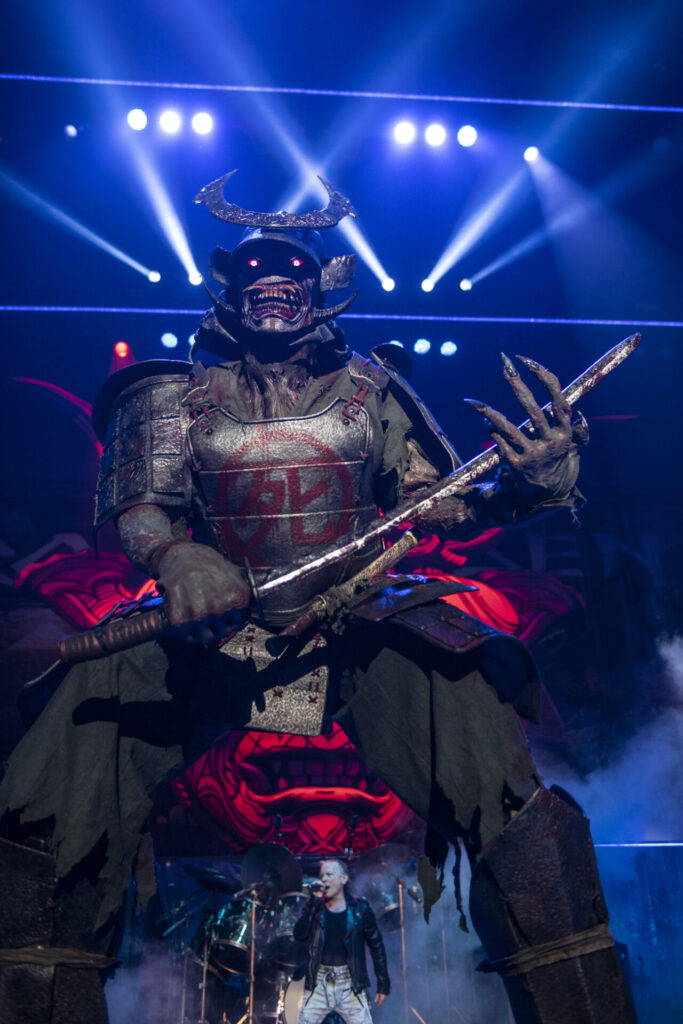
In 2019, the band were honoured by the National Congress of Argentina, the first international artists to receive such a prestigious award. That this award was given to an English band was clearly hugely significant. Talking about their shared love of football, music and food, Bruce told the audience that, “There is so much that connects us, and that is so much more important than anything that might separate us.” His acceptance speech was a masterclass in diplomacy that would have put the UK Foreign Office to shame, yet in the UK these events were entirely invisible, outside of specialist metal media. The true heart of these islands is always found in the blind spot of the establishment.
At the heart of the alchemy that is Iron Maiden is the relationship between two very different men, Dickinson and band leader Steve Harris. Harris is a solid, steadfast, single-minded, no-nonsense bloke. He is the bass player who grounds the band. Dickinson, in contrast, is an airline pilot with a voice that soars above the guitar onslaught. They are earth and air. That vast distance between them is the territory that the rest of the band fill.
This difference between the two men is evident at the start of 1983’s Piece Of Mind album. It begins with Harris’s war film-inspired song ‘Where Eagles Dare‘. This has straightforward, businesslike, descriptive lyrics, like “The confident men are waiting to drop from the sky”, and “The cable car’s the only way in, it’s really impossible to climb.” This song is then immediately followed by Dickinson’s ‘Revelations‘, which begins with a quotation from G.K. Chesterton’s ‘O God Of Earth And Altar‘ featured in The English Hymnal. Here are two men with, clearly, very different personalities, yet they are both equally ambitious, talented and unwilling to compromise. It is a volatile combination.
The two men clashed from the start. “I remember me and Steve had the most terrific argument when we finished shooting the ‘Number of the Beast’ video,” Bruce says. “We were going to go outside and sort each other out. I was like, ‘Roll up your sleeves, come on then, punch me.’ I remember Steve saying to our manager Rod, ‘He goes! He’s got to go!’ Rod just said, ‘He’s not bloody going!’ After that, we gradually settled into a bit of a truce.”
Yet Bruce and Steve need each other and in time they have come to accept this. Maiden has had other vocalists over the years, both before Bruce joined in 1981 and after he quit in 1993. These singers were often men more temperamentally similar to Harris. They have been good and sometimes great, but it is only with Dickinson that Maiden becomes more than the sum of its parts, and more than just another metal band. Their success requires the alchemy of both Harris and Dickinson for the band to truly become magic. For as Bruce’s hero William Blake wrote, “Opposition is true friendship. Without contraries is no progression.”
Blake is referenced many times in Dickinson’s solo work, not least on the album that may well be his masterpiece, 1998’s The Chemical Wedding. In the video for his most recent single ‘Rain On The Graves’, Bruce freely mixes the gothic melodrama of Hammer Horror with William Blake, at one point visually recreating Blake’s profound image ‘The Ancient of Days’. The video ends with Bruce prostrate on a replica of Blake’s grave. Dickinson is now the ambassador for the Blake Cottage Trust, who are attempting to raise money for urgently needed repairs to Blake’s cottage in Felpham. The replica grave marker will be auctioned as part of this.
“He’s an artist to whom you should aspire,” Dickinson says of Blake. “There’s a purity to what he does that is untrammelled by commerciality or anything like that. He was unpredictable, he was cranky, he was difficult to deal with. He’s uncompromising, he’s rude, he’s bellicose. But he’s incredibly powerful. He matters.”
Dickinson’s description of Blake sounds remarkably like his account of Eddie, and the spirit of defiance that turned a frightened bullied child into a fantasy version of adult success. Both Blake and Maiden are too unwilling to compromise to ever be truly acceptable to polite society, yet both became unprecedented successes on their own terms. The heart of Albion is an awkward, ridiculous one, it seems, but anyone who hears it beat is never entirely powerless.

